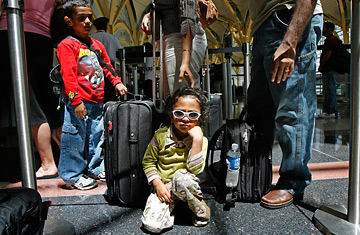
A young passenger waits to check in for her flight at Ronald Reagan Washington National Airport, May 25, 2007.
(2 of 2)
"What we want is a reasonable, predictable event and a consistent time frame when it comes to flying," says Kate Hanni, the founder of The Coalition for an Airline Passenger's Bill of Rights, a grassroots organization that formed after the American Airlines delays and now has 15,000 members; Hanni's coalition is also supported by organizations including Public Citizen and the Aviation Consumer Action Project — both founded by Ralph Nader — and U.S. PIRG (also known as Public Interest Research Groups). According to the Geneva Convention, prisoners of war have better rights than an airline passenger," adds Hanni, whose American Airlines plane was stranded for eight hours last December, during which time she says a dog defecated in the aisle and a mother was forced to make diapers out of clothing. (American Airlines denies both accusations.)
But it is unlikely that the Bill of Rights will become law — at least as it was originally intended. The Senate version of the bill, which is being reviewed now by the aviation subcommittee, has a new clause that essentially acts as a loophole for the airlines. If the airlines file "contingency plans" to the DOT that explain how they will handle future delays, the airlines would not be required to deplane passengers after four hours on the tarmac (though they would still have to ensure sanitary conditions on the planes)."This new wording does seem to negate the original purpose of the Bill of Rights, [which was] to make sure passengers aren't stranded on tarmacs," says John Gentzel, press secretary for Senator Snowe.
It looks even bleaker in the House for Rep. Thompson. His version of the bill likely won't even make it into committee. Rep. James Oberstar, the chairman of the House Transportation and Infrastructure Committee, would rather let the DOT regulate tarmac strandings than have Congress step in, says Jim Berard, the committee's spokesman.
And that's a good thing, say airline industry and experts who argue that Congress' interference would only harm consumers. "We believe a Bill of Rights would create inflexible standards that more often than not create greater inconvenience than they do today," Castelveter says. He explains that if planes were forced to return to the gate after four hours, further delays would ensue. To avoid that, airlines would cancel more flights. "Somebody who has a business meeting would much rather wait on the plane — provided they have humane circumstances — then go back to the gate and be further delayed," he says. Even flight attendants, who suffer the brunt of abuse when a plane sits on the tarmac, aren't on board with the Passenger's Bill of Rights. "We feel the Passenger's Bill of Rights would create this expectation by passengers that management and airlines couldn't possibly meet, and it would then be the flight attendants that have to bear the brunt of passenger's frustrations," says Corey Caldwell, spokeswoman for the Association of Flight Attendants (AFA), the world's largest union of flight attendants.
Fares would also likely rise if airlines are forced to compensate passengers for a breach of contract or make up for more canceled flights. "There is no free lunch," says Jon Ash, an aviation consultant and former vice-president of TWA. Getting the airlines to actually pay up could also be a challenge. In 2005, the European Union enacted its own Airline Passenger Bill of Rights, requiring airlines to compensate passengers up to $700 for delayed or canceled flights. But an E.U. report released in April showed that only 14% of passengers who had applied for compensation from the airlines had received it. Brian Havel, director of the International Aviation Law Institute, says Congress should take note of the E.U.'s failure and devise a different solution — ideally by providing adequate funds to repair the nation's "antiquated" air traffic control system.
Modernizing the U.S.' air traffic control system, which would include replacing outdated radar systems with sophisticated satellite technology, would cost at least $20 billion, and Congress may approve those funds as early as this September. They may not have a choice, because Congress must reauthorize the Federal Aviation Administration (FAA) by Sept. 30, and the FAA is pushing for the funding as part of its reauthorization.
Supporters of the Passenger's Bill of Rights remain optimistic about the bill, particularly because it has been attached as a rider to the Senate's version of the FAA reauthorization bill. "Never again, if this bill passes, will someone have to sit on a plane for hours and hours without access to potable water, food and adequate restroom facilities," says Natalie Ravitz, press secretary for Senator Boxer.
But until that bill is passed, Hanni says passengers should prepare for the worst. She advises that they pack enough medicine and food and purchase enough water before boarding. "You really have to become a savvy traveler because there is no recourse once you are on that plane," she says.
